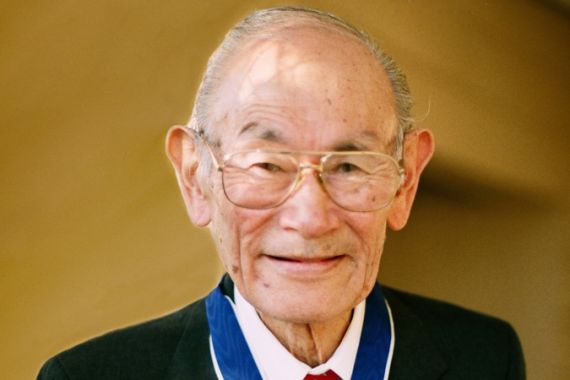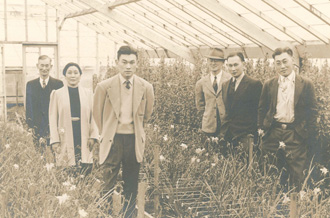Fred Korematsu: Why ignore a true hero?
While similar icons like Rosa Parks or Martin Luther King Jr get recognition, Fred Korematsu is glossed over.

UPDATE:
January 30 marked the birthday of a major civil rights hero – that of Fred Korematsu. His case is a landmark Supreme Court case. He’s the first Asian-American in the US to have a day named after him. Schools have been named in his honour. The Smithsonian included Fred in a permanent exhibit called “Struggle for Justice” at the National Portrait Gallery. So, where was the American media?
Keep reading
list of 4 itemsEurope pledges to boost aid to Sudan on unwelcome war anniversary
Birth, death, escape: Three women’s struggle through Sudan’s war
Does Israel twist humanitarian law to justify Gaza carnage?
Though other brave leaders like Martin Luther King Jr, Rosa Parks and Cesar Chavez are well known and celebrated, major media outlets give scant, if any, attention to Fred Korematsu’s memory. Is the lack of interest because Fred was Japanese-American?
Fred was my uncle by my former marriage and I am honoured to have known him. The anniversary of his birth deserves as much coverage as the equally sacrificing heroes I mentioned.
Should recent news about venal political and sports faux heroes like John Edwards, Tiger Woods and Lance Armstrong burn up the wires of the legacy and digital landscape? Should a true hero be relegated to the dust?
During World War II, Japanese-American families were rounded up – some forced to live in horse stables in the desert. Their fertile farms were ripped away from them and they were branded traitors.
Korematsu defied executive order 9066 that forced the internment of 120,000 Japanese Americans from the west coast in 1942. He thought the order was plain wrong.
He spoke out as a brave American witnessing something terribly amiss. After his arrest and conviction, he appealed but lost.
Forty years later, the modest man whose children only learned of his case in high school, was vindicated. In a landmark Supreme Court case, Korematsu’s original conviction was voided, as the judges ruled that the government had falsified evidence in his original trial. Japanese-Americans had committed no acts of treason to merit incarceration.
Interestingly, his fellow Japanese-Americans were ashamed of his speaking out during the war. It didn’t seem patriotic. They are no longer ashamed.
 |
| Fred Korematsu (centre) with his family in the flower nursery [Photo courtesy: Karen Korematsu/Korematsu Institute] |
Korematsu’s case resulted in amends in the form of $20,000 to every Japanese-American who was interned during World War II and a formal congressional apology.
I knew the man behind the iconic story. Korematsu is a magnificent example of all that is good in our country. When asked why he protested, he said he was American, “I just thought of myself as American.”
He was a hamburger-eating guy who liked westerns. He and his wife raised a son and daughter in San Leandro where he was involved with the Boy Scouts, Lion’s Club and his church. Burdened with a criminal record, the soft spoken wisp of a man remained a draftsman.
He enjoyed smoking his pipe and never complained. Despite the wrongs that he suffered, he never lost his compassion for others. Even when he was in fragile health, he flew to my son’s bar mitzvah some years back just because he thought it was the right thing to do.
Korematsu went beyond righting a personal and collective wrong. That in itself would be enough. But he was concerned about all of our civil rights. In later years, instead of resting on his laurels, he filed two amicus curiae briefs with the Supreme Court and warned about repeating the mistakes of the Japanese internment.
He spoke out about the US government restricting the civil liberties of detainees in Guantanamo Bay once again because of “military necessity”. He was concerned about racial profiling of Arab-Americans, too.
Korematsu said: “… no one should ever be locked away simply because they share the same race, ethnicity, or religion as a spy or terrorist. If that principle was not learned from the internment of Japanese-Americans, then these are very dangerous times for our democracy.”
Korematsu’s legacy is that he spoke up continually about unpopular and thorny issues. The press should point out his insistence on protections for those accused during wartime and accord him the deference he deserves. Korematsu’s gift was his insistence on human rights.
To be sure, Martin Luther King Jr, Rosa Parks and Cesar Chavez did great things and these worthy souls should garner the spotlight. I’m not asking for a parade, top story status or even a national holiday.
But President Clinton awarded Korematsu the Presidential Medal of Freedom, the highest civilian honour in the United States, in 1998, saying: “In the long history of our country’s constant search for justice, some names of ordinary citizens stand for millions of souls. Plessy, Brown, Parks… to that distinguished list, today we add the name of Fred Korematsu.”
Others should know more about this remarkable man. When we talk about heroes, let’s look at the real thing. Fred Korematsu turned his humility and humanity into powerful advocacy on behalf of all of us.
Barbara Field is an award-winning writer and women’s empowerment leader. She was on staff at CBS (NY), Harcourt Brace Publishing, and Scripps Research Institute, and a contributing writer to MyHero.com. Her novel, The Deeper, The Bluer (2000), won a Writer’s Digest fiction award. She is currently a UC San Diego project manager, Op Ed Project Regional Manager and Afghan Women’s Writing Project mentor.
